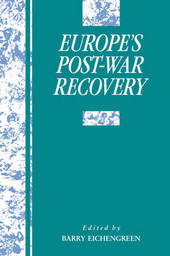
|
Europe's Postwar Recovery
Paperback / softback
Main Details
| Title |
Europe's Postwar Recovery
|
| Authors and Contributors |
Edited by Barry Eichengreen
|
| Series | Studies in Macroeconomic History |
|---|
| Physical Properties |
| Format:Paperback / softback | | Pages:368 | | Dimensions(mm): Height 228,Width 152 |
|
| Category/Genre | Economic history |
|---|
| ISBN/Barcode |
9780521030786
|
| Classifications | Dewey:330.94055 |
|---|
| Audience | | Professional & Vocational | | Tertiary Education (US: College) | |
|---|
| Illustrations |
57 Tables, unspecified; 37 Line drawings, unspecified
|
|
Publishing Details |
| Publisher |
Cambridge University Press
|
| Imprint |
Cambridge University Press
|
| Publication Date |
18 January 2007 |
| Publication Country |
United Kingdom
|
Description
Western Europe's recovery from World War II was nothing short of miraculous. From the chaos of the war and the crisis of 1947, Europe moved directly to the most rapid quarter-century of economic growth in her history. The contributors to this volume seek to identify the sources of this singularly successful recovery. That all European countries shared in the miracle suggests that its roots may lie at the international level. The chapters therefore focus on the role played by international institutions - the International Monetary Fund, the World Bank, the European Coal and Steel Community, the European Payments Union, the General Agreement on Tariffs and Trade - and weigh the relative importance of domestic and international factors in Europe's postwar recovery. This book will be of interest to students of modern European history and to economists interested in economic growth, European economic integration, and reform of the Bretton Woods institutions.
Reviews"Weurope's Post-War Recovery is a concise exposition of the favorable influence of international institutions on the European economies. It is written by leading specialists who have presented elsewhere their views at greater length. Its central chapters deserve tp reach a wide audience." Pierre Sicsic, Journal of Economic Literature "...the volume provides a good overview on contemporary research. As such, it should find a wide readership among economic historians, economists, political historians, and political scientists. Moreover, the book contains some real treasures that make it indispensable for the specialist." Journal of Economic History
|